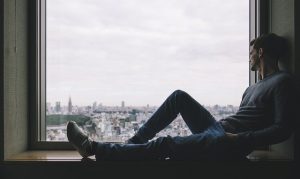Something lockdown has given us all, in perhaps more quantities than we know how to deal with, is time. And as I find myself currently living alone, with my housemates having returned to their family homes, I have had all that time to myself. I had expected this to attract some sympathy – but the more sympathy I received, the more I asked myself: why is living alone regarded with sympathy? And moreover, when I replied that I was fine by myself, why was I met with surprise?
Only upon explaining that I was only doing fine because volunteering meant that I could talk to other people did those around me find a satisfactory justification. I would therefore like to take this time to talk about my reflections on living alone, its perceived hardship, and, I would argue, its benefits.
Living alone
Living alone is largely negatively portrayed in media as reserved for the loner with few friends and strange hobbies, the mad scientist, the eccentric. It is for those who have yet to find a partner, or those left behind by one. People often mention that those that live alone ‘are more comfortable with their own space’, but often this is said in a way that implies that they have too few friends to live with.
I would argue that to be comfortable living alone, we have to be comfortable with ourselves – but this does not necessarily imply the opposite. The easiest way to describe this would be to use the classic descriptions of introverted and extroverted characteristics.
 Introverts are portrayed in general media as the shy indoors-type, occupying themselves with their studies or games. Extroverts are the fun party-goers, sporty, popular, confident and easy to talk to. I prefer, however, to define each group as those who recharge when alone, introverts, and in the company of others, extroverts. This would also imply that living alone may be easier as an introvert. Given the propensity to assume that those living alone are not comfortable however, this would assume that people generally fall into one of two camps: introverts who are not yet comfortable with themselves, or extroverts.
Introverts are portrayed in general media as the shy indoors-type, occupying themselves with their studies or games. Extroverts are the fun party-goers, sporty, popular, confident and easy to talk to. I prefer, however, to define each group as those who recharge when alone, introverts, and in the company of others, extroverts. This would also imply that living alone may be easier as an introvert. Given the propensity to assume that those living alone are not comfortable however, this would assume that people generally fall into one of two camps: introverts who are not yet comfortable with themselves, or extroverts.
Benefits
Given that this likely does describe most people, it is fair to assume that someone who is living alone is uncomfortable. However, I would argue that living alone at least for some time is beneficial, even for these groups. It enables you to focus on yourself, and pursue whatever hobbies or past-times you wish to. At the beginning, this may be uncomfortable and may be more difficult if enforced, as in lockdown. But even approaching it in your own time, or setting aside time for yourself even when living with others, may enable you to find ways to be comfortable with yourself, things you truly enjoy, and help you find greater value in friendships and the time you have with others.
 Being more comfortable in your own company is simultaneously regarded as a goal and a polite indulgence of the eccentric; society paradoxically pushes us to achieve and shun it. It is worth reflecting why this popular message of aiming to be comfortable with oneself, or ‘finding oneself’, is one only achieved away from home. The classic, almost clichéd approach of travelling abroad or meditation camps in enforced silence, rather than finding time for oneself at home, perhaps enforces this idea that being at home is not an environment where someone can be, or become, comfortable with themselves alone.
Being more comfortable in your own company is simultaneously regarded as a goal and a polite indulgence of the eccentric; society paradoxically pushes us to achieve and shun it. It is worth reflecting why this popular message of aiming to be comfortable with oneself, or ‘finding oneself’, is one only achieved away from home. The classic, almost clichéd approach of travelling abroad or meditation camps in enforced silence, rather than finding time for oneself at home, perhaps enforces this idea that being at home is not an environment where someone can be, or become, comfortable with themselves alone.
Moreover, it seems somehow lazy to ‘find yourself’ at home, although perhaps this stems from the idea that staying at home is itself lazy – a challenge to our current working at home setup. It is understandable that we regard ‘escaping’ our daily lives to travel unfamiliar surroundings alone, or an extended time dedicated to ‘finding yourself’, as more beneficial. It seems, however, that this view discourages self-reflection at home, day to day, or in the time we have. It may normally be difficult to take an extended vacation, but in our current situation we have the time to get into practises that at least in the time being can help self-reflection. Whether we can carry on these practises when life re-starts as normal is perhaps a more difficult task.
Perceived hardships
It is an interesting question to reflect on – is it a societal influence or a human desire to not be alone that leads us to dismiss living alone as stemming from necessity rather than choice. I would argue, however, that all of us should be comfortable living alone to some degree. It will be more difficult for some than others, but being self-sufficient will make future cohabitation easier for everyone – although you might develop habits that make you particularly infuriating to live with when that time comes! It is also worth clarifying, however, that I am by no means implying that everyone living alone in the current situation is coping, mentally or physically.
But this also applies to people living with others; those who value their own space may be finding the enforced lockdown challenging. The current increase in mental health awareness is important, although insufficient, and we should make note to ask rather than assume. I for one am enjoying the time to myself, and as Bertrand Russell said: ‘the time you enjoy wasting is not wasted time’. Although may be my parents would disagree.


Roshan Sreekumar
Roshan is a medical student at Oxford University. He is currently pursuing a Bachelor's in Medicine and Surgery at Green Templeton College, having graduated from Trinity College with a BA in Medical Science. "This is a long overdue attempt to start writing again, thank you for giving me the opportunity and the excuse!" says the humble doc. It is evident that the pleasure to have him on board will be all ours.

![Powerful Pride documentary Legendary Children [All Of Them Queer] streaming very soon](https://globalindianstories.org/wp-content/uploads/2025/06/Legendary-streaming-release-featured-238x178.jpg)



![Powerful Pride documentary Legendary Children [All Of Them Queer] streaming very soon](https://globalindianstories.org/wp-content/uploads/2025/06/Legendary-streaming-release-featured-100x75.jpg)

